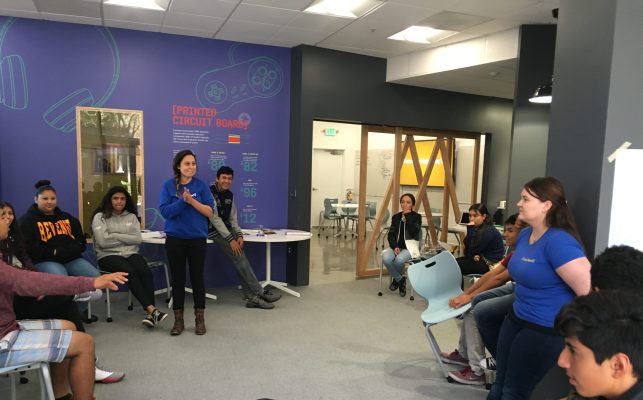Google is officially unveiling Code Next, its computer science lab for youth, today in Oakland. The program, which USA Today’s Jessica Guynn got wind of last month, is designed to offer young black and Latino people interested in tech an opportunity to learn how to code, as well as the fundamentals of computer science. That’s because 51% of black students and 47% of Latino students in the U.S. don’t have access to computer science classes in school, according to a study conducted by Google in partnership with Gallup.
Code Next will work with 70 eighth-grade students in Oakland and 70 at its location in Harlem, which is set to open in 2017. Until then, students in New York will able to attend classes at Google’s NYC headquarters.
Through Code Next’s curriculum, which was developed in partnership with MIT Media Lab, students will be able to learn how to code, participate in hands-on activities and expose themselves to computer language processing in after-school and weekend programs. The curriculum is includes core math skills necessary for coding, engineering design and leadership development. The program is free to attend, but students must be nominated by their schools and non-profit organizations like Black Girls Code.
“We want to get them to a point where they are competent, comfortable and champions in the coding space so that if they choose to get qualified in CSAP, they will be able to do that, which will help facilitate their trajectory relative to college,” MIT Media Lab’s Topper Carew told me.
Located near the Fruitvale Bay Area Rapid Transit station in Oakland, Code Next aims to be easily accessible to students from east and west Oakland, Google Student Experience Program Manager April Alvarez told me.
“As this idea was coming into fruition, we were looking at the ideal cities and neighborhoods where we were going to position ourselves,” Alvarez said. In Oakland, we thought about Fruitvale because thee’s an ecosystem of partners there committed to CS but also people disconnected from the tech industry.”
[gallery size="full" ids="1397837,1397840"]
Google’s local partner is The Unity Council, a non-profit organization that focuses on improving the lives, economic conditions, educational opportunities, and health and safety of people in low-income communities. Every year, the organization reaches about 8,000 people in Oakland and Concord.
“We’re taking a place-based approach,” Alvarez said. “We’re in the backyard of Silicon Valley and we wanted to make sure we didn’t ask students to leave their community in order to access these opportunities.”
In order to ensure Google would have a positive impact on the community, the company went into this with a community-centric approach, Alvarez said. Google conducted a listening tour and hosted a design hackathon with the community.
“We made sure we were designing with the community versus for the community,” Alvarez said. “We’ve had a positive reception and i think it’s because they understand Code Next is about the community and the kids we’re working with.”
Code Next will support the students through high school and help them get into college. Once they graduate from college, students will have the choice to opt in to the tech industry if they want to.
“These kids will definitely be set up to work at Google and will be highly competitive applicants,” Alvarez said. “They will also be set up to start their own companies — to start their own next Facebook or Apple.”
And the tech industry, which is notoriously white, could definitely use them. At Google, for example, black people make up just 2% of the employee population while Hispanics make up 3%, according to Google’s latest diversity report. Those numbers, unfortunately, are pretty much comparable with diverse representation of employees at the average tech company in Silicon Valley.
